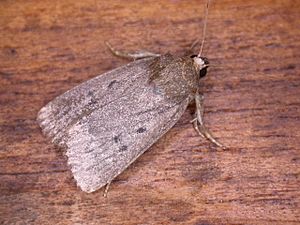Mouse moth facts for kids
Quick facts for kids Mouse moth |
|
|---|---|
 |
|
| Scientific classification |
|
| Kingdom: | Animalia |
| Phylum: | Arthropoda |
| Class: | Insecta |
| Order: | Lepidoptera |
| Superfamily: | Noctuoidea |
| Family: | Noctuidae |
| Genus: | Amphipyra |
| Species: |
A. tragopoginis
|
| Binomial name | |
| Amphipyra tragopoginis (Clerck, 1759)
|
|
| Script error: The function "autoWithCaption" does not exist. | |
Script error: No such module "Check for conflicting parameters".
The mouse moth (Amphipyra tragopoginis) is a type of moth that belongs to the Noctuidae family. It is a very common species found in many parts of the world. This moth gets its name because it often scurries away like a mouse when disturbed, instead of flying.
Contents
Where the Mouse Moth Lives
The mouse moth is found across a wide area called the Holarctic region. This includes most of Europe, except for the very far north and some southern parts like Spain and Sicily. You can also find it in places like Armenia, Asia Minor (which is part of Turkey), Syria, Iran, and Western Siberia. It even lives in Kashmir and Punjab in Asia. Recently, it has also been found in Canada and North America.
What the Mouse Moth Looks Like
The mouse moth is not very colorful, but it is easy to recognize. Its front wings are a plain dark brown. They might have some lighter scales, making them look a bit dusty. You can usually see three small, dark spots arranged in a triangle on these wings.
The back wings are a light brownish-yellow color, getting darker towards the edges. The distance across its wings, called the wingspan, is usually between 32 and 40 millimeters.
Even though it often runs away when bothered, the mouse moth can fly very well. It is attracted to lights, sweet things like sugar, and nectar-rich flowers. In places like the British Isles, adult mouse moths are active from July to September.
Life Cycle of the Mouse Moth
The mouse moth starts its life as an egg. The species spends the winter as an egg. When the egg hatches, a larva (caterpillar) emerges.
The larva is green and has yellowish or white lines along its back and sides. These caterpillars eat many different kinds of plants.
What the Mouse Moth Eats
Mouse moth caterpillars are not picky eaters! They feed on a wide variety of plants. Some of their favorite food plants include:
- Monkshood
- Chervil
- Dogbane
- Columbine
- Wormwood
- Bellflower
- Eastern redbud
- Hawthorn
- Fireweed
- Fennel
- Strawberry
- Bedstraw
- Geranium
- Scots lovage
- Toadflax
- Cow-wheat
- Monkeyflower
- Tobacco
- Parsley
- Plantain
- Poplar
- Prunus (like cherry or plum trees)
- Oak
- Redcurrant
- Rose
- Cloudberry
- Sorrel
- Willow
- Salad burnet
- Nettle
- Grape
Images for kids
See also
 In Spanish: Mariposa ratón para niños
In Spanish: Mariposa ratón para niños
 | Misty Copeland |
 | Raven Wilkinson |
 | Debra Austin |
 | Aesha Ash |


